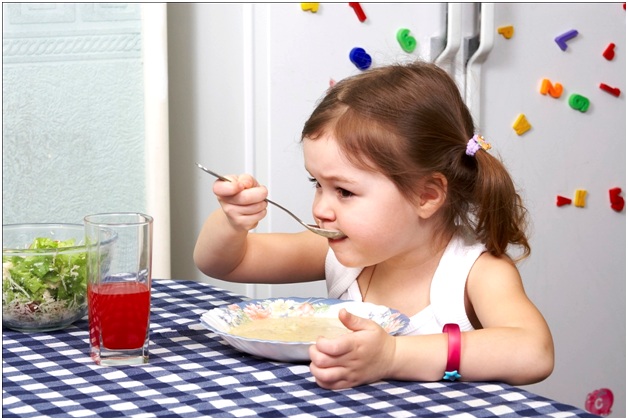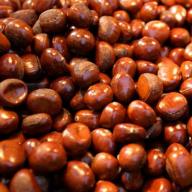The health of a child is the most important thing for every mother. Therefore, she often tries to feed him with various healthy goodies, which are not always to the liking of the little one, either because of taste characteristics, or because of lack of appetite. This alarms the mother, and she tries, by all means, to feed him. But how to increase the child's appetite and what should you pay attention to?
From this article you will learn
Why does this problem occur
Lack of appetite in children, many parents are quite difficult to experience. But before moving on to how to increase it, you should figure out why the baby refuses to eat. There may be several of them:
- Misconception about lack of appetite. Parents, without noticing it, overfeed the baby. In addition to the main meals, they give a cookie, then a bun, and when it comes to a full meal, children, as a rule, do not have a desire to eat.
- In order to feed the baby, all methods are good, and therefore very often children aged 2-3 years old eat while watching cartoons. Or rather, while the children are watching them, mom or dad stuffs cooked goodies into them. But!
Such feeding through force can harm the child, because in its process the production of digestive juices is not carried out, as it should be. Therefore, tantrums, refusal of food, the appearance of pain in the abdomen and even vomiting can become commonplace with any attempt to feed the baby.
- Lack of appetite may also be due to the fact that the child begins to get sick. This can be caused by viral or infectious diseases, as well as some problems with the gastrointestinal tract.
If the baby refuses to eat, but at the same time feels good, then there is no reason for concern. Perhaps he has not yet had time to get hungry, and nothing terrible will happen if he misses one meal. During the second, he will certainly catch up. If there have been changes in the behavior of the baby - he has become sleepy, weak, capricious, symptoms of a cold, dysbacteriosis have appeared, you should consult a doctor.
Important! It also happens that the child begins to eat poorly, refuse food due to a deficiency in his body of iron. In order to determine this, it is necessary to pass the appropriate tests and visit a doctor who will prescribe the desired vitamin complex.
Effective ways
How to stimulate appetite in a child? To do this, use the following recommendations, the observance of which in a week will give positive results. And if it was not possible to agree with a baby 2 years old and older, make sure that:
- He had a routine - this was getting up, and eating, and performing any tasks. So the child will develop an internal regime. Even if at first it may turn out to be difficult - the baby is naughty, refuses to comply with this regimen, after a few days he will get used to it. As for eating, you don’t need to force-feed anyone.
If he doesn't want to eat, he doesn't need to. But! Until the next meal, which will take place at a certain time, there should be no snacks, not even fruits, which many parents give to increase appetite. Nothing will happen to the baby in a few hours, but for the next meal, look for it, he will get really hungry and eat everything that is on his plate. And next time, he will understand that if he does not eat now, he will be hungry until the next feeding.
- His day was active. Very often, long active walks help to improve appetite in children 2-3 years old, during which the child spends a lot of energy, and the body of calories that he needs to replenish. Having run and jumped in the fresh air in the company of friends, the child will not only eat the offered products with appetite, but also fall asleep sweetly.
- The food offered looked beautiful and appetizing. Cooking food together and decorating it before serving can help stimulate appetite. After all, the baby will certainly want to try what his favorite Krosh or Barash is made of, than porridge, which has already become boring. The induced appetite can also be due to colorful interesting dishes, from which the baby will eat with great pleasure everything that his mother cooks for him.
Folk methods
At two or three years old, children already have their favorite foods, dishes, and there are those that they will not eat under any pretext. And this must be understood, because an adult, for sure, has addictions to something, and unloved foods. Therefore, it is not worth insisting on their use. But if a one-year-old baby and a little older refuses even his favorite treats, you can resort to folk methods that will help develop a feeling of hunger in the baby.

How to increase your child's appetite:
- Half an hour before meals, children can be given sour berries, fruits and juice from them. It can be raspberries, cherries, apples. If the child loves carrots, you can give it too. All this contributes to the production of gastric juice, and carrots are also good for vision.
- Half an hour before meals, you can give your child a herbal tincture, decoction or tea, but not the usual one, but made from medicinal plants:
- In the first place in terms of effectiveness are tinctures or decoctions from plants such as dandelion root, wormwood, chicory. Naturally, not every child will agree to drink such a tincture, because both wormwood and dandelion root have a bitter taste, but it is precisely because of this that the secretion of gastric juice increases. For appetite, infusions are given to children half an hour before meals according to the dosage indicated in the instructions or doctor's prescriptions.
- They are slightly inferior in effectiveness to infusions (wormwood, chicory and others), but herbal teas made from juniper, blackcurrant leaves, cumin, rose hips or sea buckthorn are more to the taste of babies. Such an appetite-increasing drink is not only effective, but also palatable, fragrant and sweet. Therefore, this option is optimal in order to increase appetite, while not harming the body of the crumbs.
- Mint or fennel will help increase the feeling of hunger. They are good because they can be used by children at any age. For example, a one-year-old baby can be given mint tea 20 minutes before meals in a teaspoon, like fennel tea. And for children over 2 years old, mint tea can be given a quarter cup several times a day before meals.
Such teas are prepared very simply: half a teaspoon of mint for 10 minutes or a teaspoon of fennel seeds for 2 hours is poured with a glass of boiling water.
- If a child loves honey, and, of course, if he is not allergic to this product, then you can increase his appetite with it. It contains royal jelly and pollen, which improves appetite, strengthens the body's immune defenses. The composition also contains substances that also have a positive effect on increasing appetite - these are bee bread and propolis.

Preparations
In addition to folk methods, it is possible to develop a feeling of hunger in children with the help of medications. But in this case, their appointment should only come from a doctor who will examine the baby and consider such therapy really a necessity. In this case, the child may be assigned:
- Means of homeopathic action - preparations with salts of magnesium and calcium, as well as complexes with Colchicum or Cina, have good reviews.
- Medications. Assign both infants and babies after a year. The doctor may prescribe the following: Lysine, Glycine, Creon (enzymes).

Important! If the child does not eat well, it is worth consulting with the doctor and asking him about taking vitamins. Contribute to the awakening of appetite vitamins of groups A, C, B12. You can buy them at a pharmacy. Manufacturers have taken care that they taste good, because their target audience is children. Most vitamins come in the form of animals, have an attractive color, which is why kids love them so much.

Using the recommendations on how to restore the baby's appetite, it will soon be possible to normalize it. The baby will begin to eat as before, and the reason for the concern of his parents will disappear, as well as attempts to feed him. Naturally, if the reasons for the lack of appetite do not lie in diseases or pathologies.




